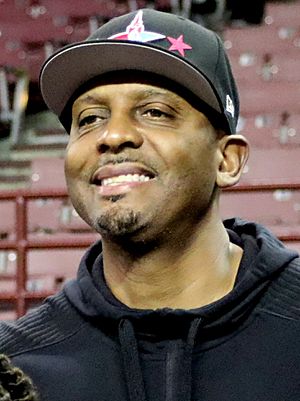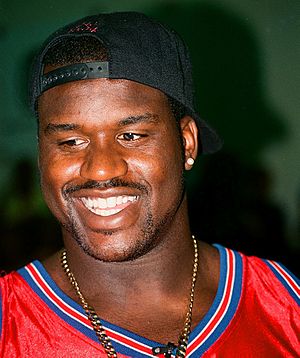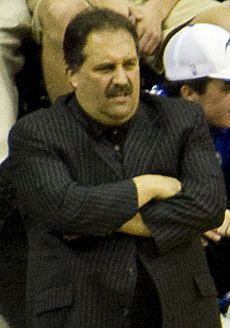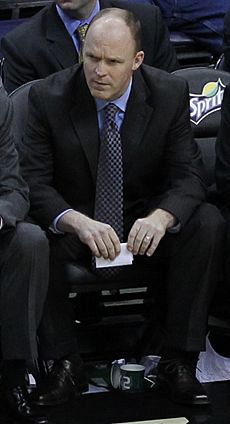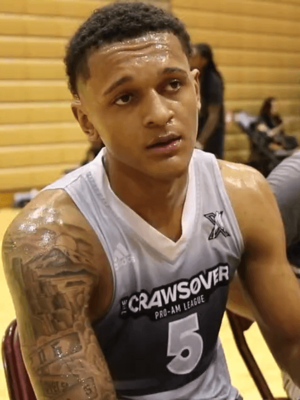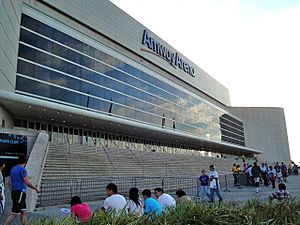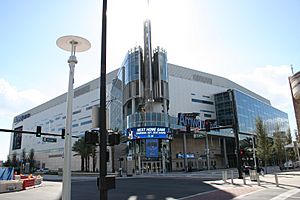Orlando Magic facts for kids
Quick facts for kids Orlando Magic |
|
|---|---|
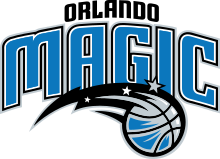 |
|
| Conference | Eastern |
| Division | Southeast |
| Founded | 1989 |
| History | Orlando Magic 1989–present |
| Arena | Kia Center |
| Location | Orlando, Florida |
| Team colors | Magic blue, black, silver |
| Main sponsor | Walt Disney World |
| CEO | Alex Martins |
| President | Jeff Weltman |
| General manager | Anthony Parker |
| Head coach | Jamahl Mosley |
| Ownership | RDV Sports, Inc. (Dan DeVos, chairman) |
| Affiliation(s) | Osceola Magic |
| Championships | 0 |
| Conference titles | 2 (1995, 2009) |
| Division titles | 8 (1995, 1996, 2008, 2009, 2010, 2019, 2024, 2025) |
| Retired numbers | 2 (6, 32) |
The Orlando Magic is a professional basketball team from Orlando, Florida. They play in the National Basketball Association (NBA). The Magic are part of the Southeast Division in the Eastern Conference. The team started in 1989 as a new expansion team.
Many famous NBA players have played for the Magic. These include Shaquille O'Neal, Penny Hardaway, Grant Hill, Tracy McGrady, Vince Carter, and Dwight Howard. The team has made it to the NBA playoffs 17 times in 35 seasons. They reached the NBA Finals twice, in 1995 and 2009. However, they lost both times, first to the Houston Rockets and then to the Los Angeles Lakers.
Contents
- Team History: How the Magic Began
- The Shaquille O'Neal and Penny Hardaway Era (1992–1996)
- After Shaq: The Penny Hardaway Era (1996–1999)
- The "Heart and Hustle" Season (1999–2000)
- The Tracy McGrady Era (2000–2004)
- The Dwight Howard Era (2004–2012)
- Struggles and New Talent (2012–2021)
- The Paolo Banchero Era (2022–Present)
- Home Arenas
- Team Identity
- Team Personnel
- Head Coaches
- Recent Season Records
- Team Rivalries
- Media Coverage
- Team Leaders
- Team Awards and Honors
- See also
Team History: How the Magic Began
Starting the Team in Orlando (1985–1989)
In 1985, Orlando businessman Jim L. Hewitt had an idea. He wanted to bring an NBA team to Orlando. He talked to Pat Williams, who was a general manager for another team. Williams liked the idea and helped lead a group of investors.
On June 19, 1986, they announced their plan to get an NBA team. Hewitt and Williams also held a contest in the Orlando Sentinel newspaper. They asked people to suggest names for the new team.
Choosing the "Magic" Name
Out of over 4,000 ideas, four names were chosen: "Heat," "Tropics," "Juice," and "Magic." The name "Magic" was picked after Williams' seven-year-old daughter, Karyn, visited Orlando. She said the city felt "magical."
On July 27, 1986, it was announced that the new team would be called the Orlando Magic. The name "Magic" connects to Walt Disney World and its Magic Kingdom, which is a big tourist spot in the area.
Joining the NBA League
Many people, including Williams, thought other Florida cities like Miami or Tampa would be better for a team. Orlando was a smaller city back then. But Hewitt found investors and convinced city officials to build an arena. Williams also showed NBA commissioner David Stern that Orlando was a good choice.
In 1987, the NBA decided to add four new teams. Both Miami and Orlando got a team. The Orlando Magic became the first major professional sports team in the area. They were one of four new teams, along with the Charlotte Hornets, Miami Heat, and Minnesota Timberwolves. The Magic hired Matt Guokas as their first coach. On June 15, 1989, they picked 12 players in the NBA expansion draft.
Early Years and First Stars (1989–1992)
In their first year, the Magic picked Nick Anderson in the 1989 NBA draft. He was their first star player and led the team in scoring for many years.
The Magic played their first game on October 13, 1989. It was an exhibition game against the Detroit Pistons, and the Magic won! Their first regular season game was on November 4, 1989, against the New Jersey Nets. The Magic lost that game, but they got their first win two days later against the New York Knicks. The team finished their first season with 18 wins and 64 losses. Key players included Nick Anderson, Reggie Theus, Scott Skiles, and Terry Catledge.
In the 1990 NBA draft, the Magic picked Dennis Scott. On December 30, 1990, Scott Skiles set an NBA record with 30 assists in one game! He was named the NBA's Most Improved Player that season. Dennis Scott also set a team record for three-pointers by a rookie.
In 1991, the DeVos family, who founded Amway, bought the team. The 1991–92 season was tough because many players got injured. The team struggled with a 17-game losing streak. Even so, all 41 home games were sold out!
The Shaquille O'Neal and Penny Hardaway Era (1992–1996)
The Magic's history changed on May 17, 1992. They won the first pick in the 1992 NBA draft Lottery. They chose Shaquille O'Neal, a huge center from Louisiana State University. Shaq made a big impact right away. The team improved by 20 wins, finishing with a 41–41 record. O'Neal was the first rookie since Michael Jordan to be voted an All-Star starter. He also won the NBA Rookie of the Year award.
In 1993, the Magic won the first draft pick again! They picked Chris Webber but traded him to the Golden State Warriors. In return, they got the third pick, guard Penny Hardaway, and future draft picks. With O'Neal and Hardaway playing together, the Magic became a very strong team. They won 50 games for the first time in team history. They made the playoffs but lost in the first round.
In the 1994–95 season, the Magic added Horace Grant from the Chicago Bulls. The team had an amazing 57–25 record, the best in the Eastern Conference. They won their division title. In the playoffs, they beat the Boston Celtics, the Bulls, and the Indiana Pacers. This led them to the NBA Finals for the first time! However, the young Magic team lost to the experienced Houston Rockets in four games.
The 1995–96 season was another great one. The Magic had a 60–22 record, led by O'Neal and Hardaway. They were the second-best team in the East, behind the Chicago Bulls, who had a record of 72 wins and 10 losses. In the playoffs, the Magic beat the Detroit Pistons and the Atlanta Hawks. But they lost to the Bulls in the Eastern Conference Finals.
After Shaq: The Penny Hardaway Era (1996–1999)
After the 1996 season, Shaquille O'Neal left the Magic to join the Los Angeles Lakers. This was a big loss for the team. During the next season, coach Brian Hill was fired, and Richie Adubato became the interim coach. Penny Hardaway led the team to a 45–37 record. In the playoffs, they lost to the Miami Heat in a tough five-game series.
The Magic then hired Chuck Daly as head coach for the 1997–98 season. Hall of Famer Julius Erving also joined the team's front office. But Penny Hardaway was injured for most of the season. The team finished with a 41–41 record and missed the playoffs.
In the 1998–99 season, with Hardaway healthy, the Magic tied for the best record in the Eastern Conference (33–17) in a shorter season. Darrell Armstrong was a key player, winning the NBA's Sixth-Man and Most Improved Player awards. The team also got NBA legend Dominique Wilkins. In the playoffs, the Magic lost to the Philadelphia 76ers. The team also changed their uniforms, moving from pinstripes to a design with stars.
The "Heart and Hustle" Season (1999–2000)
In 1999, the Magic hired a new coach, Doc Rivers. They also traded Penny Hardaway to the Phoenix Suns. The team was then made up of mostly new players with little experience. But led by team captain Darrell Armstrong and coach Rivers, the Magic surprised everyone. They finished with a 41–41 record, just missing the playoffs. Coach Rivers was named Coach of the Year. This season was known for its "Heart and Hustle" slogan because the team played with so much effort.
The Tracy McGrady Era (2000–2004)
The next summer, the Magic tried to sign three big free agents: Tim Duncan, Grant Hill, and Tracy McGrady. Duncan stayed with his team, but the Magic signed Hill and McGrady. Everyone expected the Magic to be a top team. However, Hill was injured and played only a few games.
McGrady became a huge star, leading the NBA in scoring. With the addition of Mike Miller, the Magic won 43 games and made the playoffs. McGrady was an All-Star, and Miller won Rookie of the Year. They lost in the first round of the playoffs.
In the 2001–02 season, McGrady led the Magic to 44 wins. Hill was still injured for most of the season. McGrady continued to be an All-Star. The Magic lost in the first round of the playoffs again.
In the 2002–03 season, McGrady led the league in scoring with 32.1 points per game. The Magic made the playoffs for the third year in a row. They took a 3–1 lead in their series against the Detroit Pistons but then lost the next three games, losing the series 4–3.
The 2003–04 season was very tough. The Magic lost 19 games in a row, a team record. Coach Doc Rivers was fired during this streak. Despite this, McGrady led the league in scoring again.
The Dwight Howard Era (2004–2012)
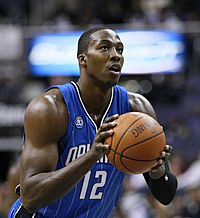
Before the next season, the team made big changes. They traded Tracy McGrady to the Houston Rockets. With the first pick in the 2004 NBA draft, the Magic chose Dwight Howard, a talented high school player who would become a future All-Star. They also traded for point guard Jameer Nelson.
The team started well but then struggled with injuries. Howard showed great promise, becoming one of the few rookies to average a "double-double" (double-digit points and rebounds). Nelson also became a strong player. Grant Hill returned from injury and played well. The Magic finished the season with 36 wins and 46 losses, just missing the playoffs.
In 2005, Brian Hill returned as head coach. The 2005–06 season had high hopes, but injuries continued to hurt the team. Despite a strong finish, they missed the playoffs.
Return to the NBA Finals (2006–2010)
In the 2006 NBA draft, the Magic picked JJ Redick. Dwight Howard continued to improve and was selected for his first All-Star team. The Magic made the playoffs in 2007, their first time since 2003. They lost in the first round to the Detroit Pistons.
In 2007, the Magic hired Stan Van Gundy as their new head coach. They also signed Rashard Lewis to a big contract. The Magic started the 2007–08 NBA season very well. They won the Southeast Division title, their first since 1996. They finished the season with 52 wins, their best record in years. In the playoffs, they won their first series in 12 years, beating the Toronto Raptors. However, they lost to the Detroit Pistons in the next round. Hedo Türkoğlu won the Most Improved Player award that season.
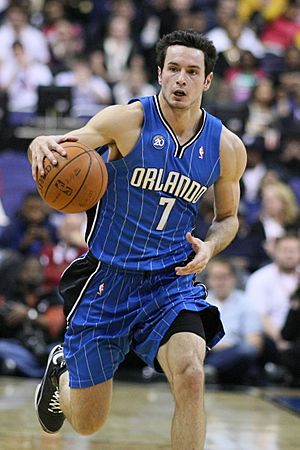
The 2008–09 season was excellent. The Magic finished with 59 wins, their most since 1996. In the playoffs, they beat the Philadelphia 76ers and then the defending champions, the Boston Celtics. They reached the Eastern Conference Finals and defeated LeBron James and the Cleveland Cavaliers. This sent them to the NBA Finals for the second time in team history! They won their first-ever Finals game in Game 3 against the Los Angeles Lakers. But the Lakers won the series in five games.
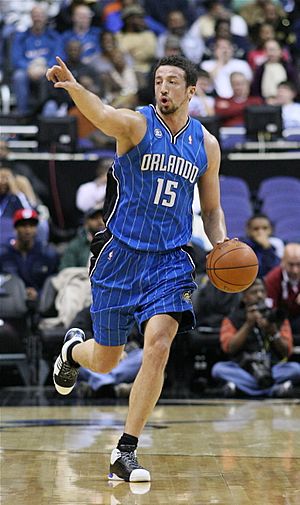
Before the 2009–10 season, the Magic traded for eight-time All-Star Vince Carter. They also signed Brandon Bass, Matt Barnes, and Jason Williams. The Magic had a strong season despite injuries to key players. They finished with 59 wins again and won their third straight division championship. In the playoffs, they swept the Charlotte Bobcats and the Atlanta Hawks. They then faced the Boston Celtics in the conference finals. After losing the first three games, the Magic won the next two but lost Game 6, ending their season.
The "Dwightmare" and Rebuilding (2010–2012)
In 2010, the Magic updated their logo and added black alternate uniforms. They also hosted the NBA All-Star Game in 2012.
In December 2010, the Magic made a big trade. They sent Vince Carter and others to Phoenix for Hedo Türkoğlu and Jason Richardson. They also traded Rashard Lewis for Gilbert Arenas. The Magic finished with 52 wins but lost in the first round of the playoffs.
The 2011–12 season was difficult. Dwight Howard asked to be traded, which caused a lot of uncertainty. Howard eventually had back surgery, ending his season early. The Magic still made the playoffs but lost in the first round.
In May 2012, general manager Otis Smith and head coach Stan Van Gundy left the team. Rob Hennigan became the new general manager. In August 2012, Dwight Howard was traded to the Los Angeles Lakers in a big four-team deal. Howard left as the Magic's all-time leader in points, blocks, and rebounds.
Struggles and New Talent (2012–2021)
The Rob Hennigan Era (2012–2017)
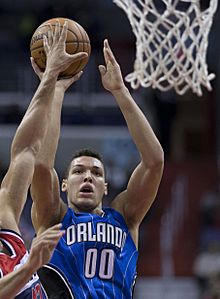
After trading Dwight Howard, the Magic began to rebuild their team. They focused on young players like Maurice Harkless and Nikola Vučević. In December 2012, the Magic beat the Lakers in Howard's first game against his old team.
The Magic finished the 2012–13 NBA season with the worst record in the NBA, missing the playoffs. In the 2013 NBA draft, they picked Victor Oladipo. The Magic continued to struggle, finishing with a poor record in the 2013–14 NBA season. In the 2014 NBA draft, they selected Aaron Gordon and traded for Elfrid Payton.
In 2015, former Magic player Scott Skiles became the head coach. The Magic picked Mario Hezonja in the 2015 NBA draft. In 2016, Skiles stepped down, and Frank Vogel became the new coach. The Magic made many roster changes, including trading for Serge Ibaka. However, they continued to have losing seasons.
The Jeff Weltman Era (2017–2022)
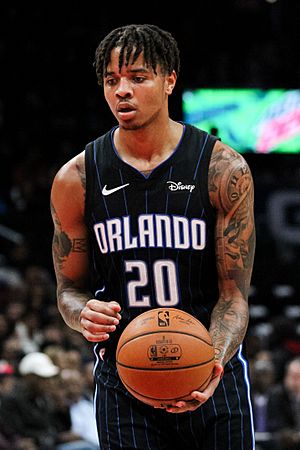
In 2017, Rob Hennigan was fired. Jeff Weltman became the president of basketball operations, and John Hammond became the new general manager. The Magic drafted Jonathan Isaac in the 2017 NBA draft. Former superstar Tracy McGrady also rejoined the team as an assistant to the CEO.
In 2018, head coach Frank Vogel was fired. Steve Clifford was named the new head coach. The Magic drafted Mohamed Bamba in the 2018 NBA Draft.
During the 2018–19 season, the Magic won their division title and made the playoffs for the first time since 2012. Nikola Vučević was selected as an All-Star, the first Magic All-Star since Dwight Howard. The Magic faced the Toronto Raptors in the first round of the playoffs. They won their first playoff game in seven years but lost the series in five games.
In the 2019 NBA draft, the Magic selected Chuma Okeke. The team made the playoffs again in the 2019–20 season, which was shortened by the COVID-19 pandemic. Despite injuries, they earned the eighth playoff spot but lost to the Milwaukee Bucks in the first round.
In the 2020 NBA draft, the Magic selected Cole Anthony. Injuries continued to affect the team, with Jonathan Isaac and Markelle Fultz suffering season-ending injuries. At the 2021 NBA trade deadline, the Magic traded away Nikola Vučević, Aaron Gordon, and Evan Fournier. This marked the start of another rebuilding period. At the end of the season, coach Clifford left the team.
In July 2021, Jamahl Mosley was named the new head coach. The Magic selected Jalen Suggs and Franz Wagner in the 2021 NBA draft.
The Paolo Banchero Era (2022–Present)
Paolo Banchero's First Year (2022–2023)
On June 23, 2022, the Magic selected Paolo Banchero from Duke University with the first pick in the 2022 NBA draft. Banchero helped the Magic improve their record from 22 wins to 34 wins. He averaged 20 points per game and was chosen as the Rookie of the Year.
In June 2023, the Magic selected Anthony Black and Jett Howard in the draft. The team also promoted Anthony Parker to general manager.
Rising in the Playoffs (2023–Present)
The 2023–24 season saw the young Orlando Magic become a playoff team. Paolo Banchero made his first All-Star team. Jalen Suggs was named to the NBA All-Defensive Second Team. The Magic finished with 47 wins and 35 losses, earning the fifth spot in the Eastern Conference. They pushed the Cleveland Cavaliers to seven games in the first round of the playoffs but ultimately lost the series.
Before the current season, the Magic did not re-sign Markelle Fultz. They drafted Tristan da Silva and signed Kentavious Caldwell-Pope. They also extended Franz Wagner's contract.
The 2024–25 season saw the Magic finish with 41 wins and 41 losses, winning their division. They lost in the first round of the playoffs to the Boston Celtics.
Home Arenas
Amway Arena: The First Home
Amway Arena opened in 1989 and was the Magic's home from their start until the 2009–10 season. It was first called the Orlando Arena, or "O-Rena." Later, it was named the TD Waterhouse Centre before Amway bought the naming rights in 2006.
Kia Center: The Current Home
The team's current home, Kia Center, opened on October 1, 2010. It was originally called Amway Center. The Magic played their first game there on October 10 against the New Orleans Hornets. In 2012, the Kia Center hosted the All-Star Weekend.
When it opened, the Kia Center had the largest Jumbotron in the NBA. It also has large digital screens inside and a huge video display outside. On December 20, 2023, Amway Center was officially renamed Kia Center.
Team Identity
Logos and Uniforms
Original Pinstripes (1989–1998)
The first Magic uniforms were designed with black pinstripes on white for home games and black for away games. The logo had a basketball with stars and the word "Magic" with a star instead of the "A." The colors were black, a special electric blue, and silver. In 1994, the away uniform changed to blue with white pinstripes.
Sublimated Stars (1998–2003)
For their 10th anniversary in 1998, the Magic got a new look. The pinstripes moved to the sides, and the uniforms had stars in the background. Both home (white) and away (blue) jerseys featured the "Magic" wordmark.
Back to Basics (2003–2008)
For their 15th anniversary in 2003, the Magic changed their uniforms again for a simpler look. They removed the pinstripes and stars from the main design. The home jerseys were white with blue "Magic" letters. The away jerseys were blue with white "Orlando" letters. The team also wore their original pinstriped jerseys as alternate uniforms sometimes.
Pinstripes Return (2008–2017)
In 2008, the Magic brought back pinstriped uniforms to celebrate their 20th anniversary. The new design mixed elements from their past uniforms. Home jerseys were white with silver pinstripes, and away jerseys were blue with white pinstripes. They also added a black alternate uniform in 2010.
Nike Takes Over (2017–2025)
When Nike became the NBA's uniform provider in 2017, the Magic made small changes. They had white "Association," blue "Icon," and black "Statement" uniforms. The black uniform later became the "Icon" uniform, and a new blue uniform became the "Statement" uniform. These uniforms were inspired by different looks from the team's history. Starting in 2020, the "Statement" uniforms featured the Jordan Brand logo. Disney is their jersey sponsor.
Homage to the Classics (2025–Present)
For the 2025–26 season, the Magic unveiled new logos and uniforms. They brought back a modern version of their original "streaking ball with stars" logo. The uniforms are a modern take on the first pinstripe look, with a silver star replacing the "A" in "Magic." Blue is the main color for the "Icon" uniform, and the black "Statement" uniform pays tribute to old warm-up gear.
City Edition Uniforms
Each year, Nike creates special "City" edition uniforms that honor local culture or team history.
- "Stars" (2017–2019): These uniforms featured a pattern of stars and the team's alternate logo.
- "Orange" (2019–2022): These uniforms used orange colors to celebrate Florida's orange-growing industry. They had different designs each year, sometimes with a gray base and orange letters, or a white base with orange letters and pinstripes.
- "Kingdom" (2022–Present): These uniforms have a black or platinum base with gothic-inspired letters and silver stripes. They represent the team and city as a "kingdom on the rise."
Earned and Classic Uniforms
The Magic also had an "Earned" uniform in 2020, which was white with blue numbers and black and silver trim. They have also worn "Classic" uniforms to celebrate anniversaries. For their 30th anniversary, they wore blue pinstriped uniforms from the 1990s. For their 35th anniversary, they wore the blue "sublimated stars" uniform from 1999–2003.
Mascot
Stuff the Magic Dragon has been the Magic's mascot since 1989. He is a friendly dragon whose name is a fun play on words.
Team Personnel
Retired Numbers
The Orlando Magic has retired two numbers to honor important parts of their history:
- 6 for the Fans (also known as "The Sixth Man")
- 32 for Shaquille O'Neal
Basketball Hall of Famers
Several players and coaches who were part of the Orlando Magic have been inducted into the Basketball Hall of Fame:
- Dominique Wilkins (Player)
- Patrick Ewing (Player, also assistant coach)
- Shaquille O'Neal (Player)
- Tracy McGrady (Player)
- Grant Hill (Player)
- Ben Wallace (Player)
- Vince Carter (Player)
- Chuck Daly (Head coach)
Orlando Magic Hall of Fame
The Orlando Magic also has its own Hall of Fame to honor those who made a big impact on the team and community. Some members include:
- Nick Anderson (Player)
- Shaquille O'Neal (Player)
- Penny Hardaway (Player)
- Tracy McGrady (Player)
- Darrell Armstrong (Player)
- Dennis Scott (Player)
- Dwight Howard (Player)
- Pat Williams (Co-founder)
- Richard DeVos (Owner)
- Jim Hewitt (Founder)
- David Steele (Broadcaster)
- Brian Hill (Head coach)
- John Gabriel (General manager)
Head Coaches
The Orlando Magic has had several head coaches throughout its history.
Recent Season Records
Here are the Magic's records for the last five completed seasons:
| Season | Games Played | Wins | Losses | Winning Percentage | Finish | Playoffs |
| 2020–21 | 72 | 21 | 51 | .292 | 5th, Southeast | Did not qualify |
| 2021–22 | 82 | 22 | 60 | .268 | 5th, Southeast | Did not qualify |
| 2022–23 | 82 | 34 | 48 | .415 | 4th, Southeast | Did not qualify |
| 2023–24 | 82 | 47 | 35 | .573 | 1st, Southeast | Lost in first round, 3–4 (Cavaliers) |
| 2024–25 | 82 | 41 | 41 | .500 | 1st, Southeast | Lost in first round, 1–4 (Celtics) |
Team Rivalries
Orlando Magic vs. Miami Heat
The Orlando Magic and the Miami Heat have a rivalry because both teams are in Florida. This is known as the Sunshine State rivalry. It became intense when stars like Shaquille O'Neal and Penny Hardaway played for Orlando, and Alonzo Mourning and Tim Hardaway played for Miami. They met in the playoffs in 1997, with Miami winning.
The rivalry grew stronger in the 2000s and early 2010s with Dwyane Wade for Miami and Dwight Howard for Orlando. When Miami added stars like LeBron James and Chris Bosh, the competition was fierce. However, after Dwight Howard left the Magic in 2012, the rivalry became less intense as the Magic went through a rebuilding phase.
Orlando Magic vs. Atlanta Hawks
The Atlanta Hawks and the Orlando Magic also had a strong rivalry. This was often seen in their playoff games and the rise of stars like Dwight Howard and Josh Smith.
The two teams played each other in the playoffs three times. The Magic beat the Hawks in 1996 and swept them in 2010. But the Hawks eliminated the Magic in 2011.
Media Coverage
Television Broadcasts
The Orlando Magic games are currently broadcast on FanDuel Sports Florida. The play-by-play announcer is David Steele, and the color analyst is Jeff Turner, who used to play for the Magic. Paul Kennedy and Dante Marchetelli are courtside reporters. Marchetelli, former coach Brian Hill, and former player Nick Anderson host the pre-game and post-game shows.
Radio Broadcasts
Magic games are broadcast on the Magic Radio Network. The main station is AM 580 WDBO in Orlando. Other stations across Florida also carry the games.
Podcasts
The official Orlando Magic website offers podcasts, including "Magic Overtime with Dante and Galante," which can be found on iTunes.
Team Leaders
Franchise Leaders in Points (Regular Season)
(As of the 2024–25 NBA season)
- Dwight Howard (11,435 points)
- Nick Anderson (10,650 points)
- Nikola Vučević (10,423 points)
- Tracy McGrady (8,298 points)
- Jameer Nelson (8,184 points)
- Shaquille O'Neal (8,019 points)
- Hedo Türkoğlu (7,216 points)
- Evan Fournier (7,049 points)
- Penny Hardaway (7,018 points)
- Dennis Scott (6,603 points)
Other Franchise Leaders (Regular Season)
(As of the 2024–25 NBA season)
- Most Minutes Played: Dwight Howard (22,471)
- Most Rebounds: Dwight Howard (8,072)
- Most Assists: Jameer Nelson (3,501)
- Most Steals: Nick Anderson (1,004)
- Most Blocks: Dwight Howard (1,344)
- Most Three-Pointers Made: Dennis Scott (981)
Individual Game Records
- Most points in one game: 62 by Tracy McGrady (March 10, 2004, vs. Washington Wizards)
- Most free throws attempted in one game: 39 by Dwight Howard (January 12, 2012, vs. Golden State Warriors) - This is an NBA Record!
- Most assists made in one game: 30 by Scott Skiles (December 30, 1990, vs. Denver Nuggets) - This is an NBA Record!
- Most rebounds in one game: 29 by Nikola Vučević (December 31, 2012, vs. Miami Heat)
Team Awards and Honors
Individual Player Awards
- NBA Defensive Player of the Year: Dwight Howard (2009, 2010, 2011)
- NBA Rookie of the Year: Shaquille O'Neal (1993), Mike Miller (2001), Paolo Banchero (2023)
- NBA Sixth Man of the Year: Darrell Armstrong (1999)
- NBA Most Improved Player of the Year: Scott Skiles (1991), Darrell Armstrong (1999), Tracy McGrady (2001), Hedo Türkoğlu (2008), Ryan Anderson (2012)
- NBA Coach of the Year: Doc Rivers (2000)
- NBA scoring champion: Shaquille O'Neal (1995), Tracy McGrady (2003, 2004)
NBA All-Star Team Selections
Many Magic players have been chosen to play in the NBA All-Star Game:
- Shaquille O'Neal (1993–1996)
- Penny Hardaway (1995–1998)
- Tracy McGrady (2001–2004)
- Grant Hill (2001, 2005)
- Dwight Howard (2007–2012)
- Rashard Lewis (2009)
- Jameer Nelson (2009)
- Nikola Vučević (2019, 2021)
- Paolo Banchero (2024)
See also
 In Spanish: Orlando Magic para niños
In Spanish: Orlando Magic para niños
 | May Edward Chinn |
 | Rebecca Cole |
 | Alexa Canady |
 | Dorothy Lavinia Brown |


